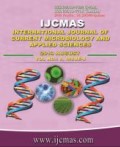


 National Academy of Agricultural Sciences (NAAS)
National Academy of Agricultural Sciences (NAAS)

|
PRINT ISSN : 2319-7692
Online ISSN : 2319-7706 Issues : 12 per year Publisher : Excellent Publishers Email : editorijcmas@gmail.com / submit@ijcmas.com Editor-in-chief: Dr.M.Prakash Index Copernicus ICV 2018: 95.39 NAAS RATING 2020: 5.38 |
The fungus Lasiodiplodia theobromae causes black rot in maize seeds, leading to losses in crops production. The fungicides used in the control of black rot are highly toxic, requiring the development of less harmful control techniques. This work evaluates the effect of Melaleuca essential oil against L. theobromae, both under in vitro conditions and on maize seeds. The in vitro experiment compared the growth of the fungus in PDA culture medium containing the oil at 0.25, 0.50, 075, and 1.0%, a negative control, and positive control (Thiram fungicide). The in vivo experiment analyzed the incidence of L. theobromae in maize seeds treated with the essential oil at 0.50, 0.75, and 1.00%, and in the negative and positive controls. After the treatments of seeds, we inoculated them with the fungus and performed sanity tests. In the in vitro test, Melaleuca essential oil inhibited 100% of mycelial growth in the 0.75% concentration. In the in vivo test, the oil at 1.0% concentration reduced the incidence of fungus in the seeds to 45%, being more effective than the synthetic fungicide. Thus, Melaleuca oil has a strong potential as a control agent against fungus L. theobromae in maize seeds.
 |
 |
 |
 |
 |